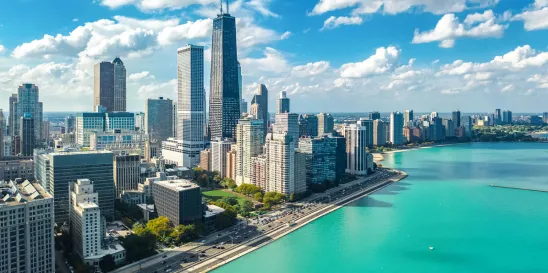As of December 31, 2023, all employees physically working in Chicago for at least two hours in a two-week period will earn both one hour of paid leave and one hour of paid sick leave for every 35 hours worked, pursuant to an ordinance passed by the Chicago City Council on November 9, 2023. The new ordinance expands the current ordinance, which requires employers to provide only paid sick leave to employees.
IN DEPTH
CHANGES TO PAID LEAVE IN THE WINDY CITY
The new ordinance expands the eligibility requirements and will now include all employers who gainfully employ at least one employee performing at least two hours of work while physically present within the geographic boundaries of the city of Chicago in any two-week period. Notably, the employer need not be located in Chicago for the new ordinance to apply.
And the changes do not stop there. Unlike the existing ordinance, employees will now receive 10 paid leave days divided into two categories: five days of general paid leave and five days of paid sick leave. Employers may choose to provide the leave as an accrual method (“earn as you go”) or decide to frontload each type of leave on the first day of each 12-month accrual period. While both types of leave will accrue at a rate of one hour for every 35 hours worked, the two categories have their nuances:
| Paid Leave Days | Paid Sick Leave | |
|---|---|---|
| When do employees become eligible to use the leave? | Employees become eligible to use paid leave after 90 days of employment. | Employees become eligible to take paid sick leave after 30 days of employment. |
| Are employees required to seek approval or provide notice of the leave? | Employers can require pre-approval to use paid leave, but employees are allowed to use their leave for any reason. Employers may not require an employee to provide documentation of the leave reason. | Employees may be required to provide up to seven days’ notice to use paid sick time or as soon as the employee becomes aware they will need to use paid sick time. Employers can request documentation from a doctor if employees use three or more consecutive days of paid sick leave. |
| What can leave be used for? | Employees may use paid leave for any reason. | Paid sick leave can be used to recover from illness, care for a family member, address domestic violence or in response to public health emergencies. |
| How much leave can be taken at one time? | Paid leave must be used in four-hour increments. | Paid sick leave may be taken in two-hour increments. |
| Does leave carry over from one year to the next? | Employees may be entitled to carry over up to two days (16 hours) of paid leave, unless the paid leave is frontloaded. | Employees will be allowed to carry over up to 10 days (80 hours) of sick time, regardless of whether paid sick leave is accrued or frontloaded. |
PAYOUT OF PAID LEAVE UPON SEPARATION AND TRANSFER
The new ordinance includes various levels of payout of paid leave, determinative of the employer’s workforce:
- Employers with 100 or more Chicago employees will be required to pay out any unused, accrued paid time off.
- Employers with 51 to 100 Chicago employees will be required to pay out a maximum of two days (16 hours) of accrued, unused paid leave until December 31, 2024, unless the employer has set a higher limit. On January 1, 2025, these employers will be required to pay out all unused, accrued paid leave.
- Employers with less than 50 employees are not required to pay out any unused, accrued paid leave.
Remarkably, the new ordinance requires payout of paid leave (if any) upon both separation of employment and if the employee transfers outside of the geographic boundaries of Chicago. Regardless of the size of the workforce, employers are not required to pay out accrued but unused paid sick leave upon separation or transfer out of Chicago.
NOTICE REQUIREMENTS
The new ordinance requires that employers provide employees with notice of paid leave policies, including:
- Providing written notice to employees of paid time off policies when they receive their first paycheck and annually with a paycheck issued within 30 days of July 1 of every year.
- Providing notice within five days before any changes to the employer’s policies.
- Posting a physical notice advising employees of their right to paid time off in a conspicuous place at each physical location where any employee works in Chicago.
EMPLOYER CONSIDERATIONS
Employers looking to avoid penalties (which can range between $1,000 and $3,000 for each separate offense, not including notice failures) should ensure their policies are in compliance, taking care to ensure employees are accruing one hour of paid leave and paid sick leave for every 35 hours worked. Additionally, employers should make sure any requirements imposed on taking and using leave are reasonable under the new ordinance. Note that unlimited paid time off policies are compliant with the new ordinance.
Importantly, the Illinois Paid Leave for All Workers Act (PLAWA), which takes effect on January 1, 2024, will not apply to the Chicago Ordinance, as the PLAWA excludes “any employer that is covered by a municipal or county ordinance…that requires employers to give any form of paid leave to their employees, including paid sick leave or paid leave.” Nonetheless, employers with employees in Illinois, in Chicago and beyond should take care to ensure their policies are compliant with this seemingly ever-changing area of the law in the Land of Lincoln.




 />i
/>i
